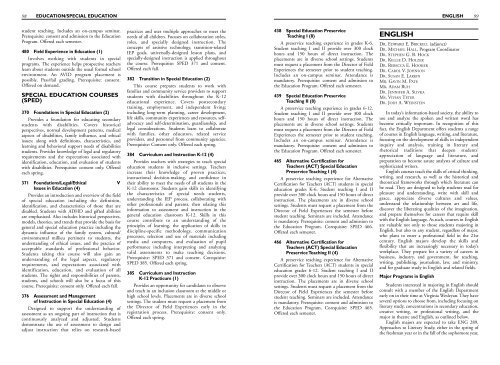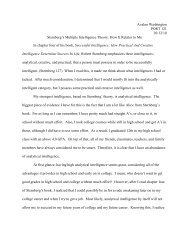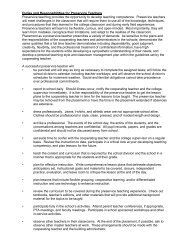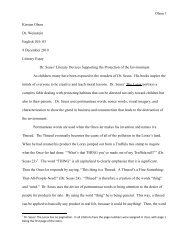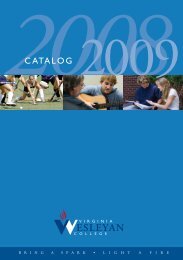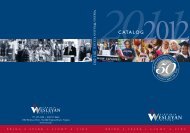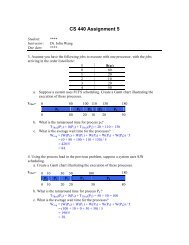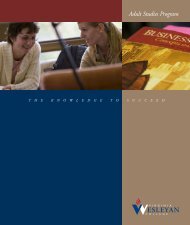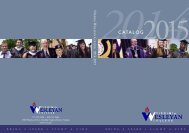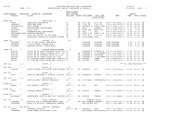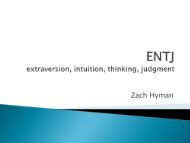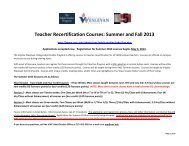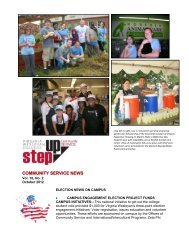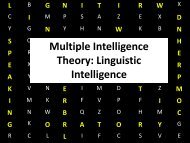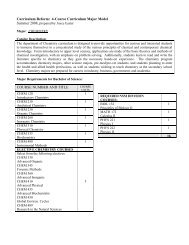2013-2014 Catalog - Virginia Wesleyan College
2013-2014 Catalog - Virginia Wesleyan College
2013-2014 Catalog - Virginia Wesleyan College
- No tags were found...
Create successful ePaper yourself
Turn your PDF publications into a flip-book with our unique Google optimized e-Paper software.
98 EDUCATION/SPECIAL EDUCATIONENGLISH99student teaching. Includes an on-campus seminar.Prerequisite: consent and admission to the EducationProgram. Offered each semester.480 Field Experience in Education (1)Involves working with students in specialprograms. The experience helps prospective teacherslearn about students outside the usual formal schoolenvironment. An AVID program placement ispossible. Pass/fail grading. Prerequisite: consent.Offered on demand.SPECIAL EDUCATION COURSES(SPED)370 Foundations in Special Education (2)Provides a foundation for educating secondarystudents with disabilities. Covers historicalperspectives, normal development patterns, medicalaspects of disabilities, family influence, and ethicalissues; along with definitions, characteristics, andlearning and behavioral support needs of disabilitiesstudents. Provides knowledge of legal and regulatoryrequirements and the expectations associated withidentification, education, and evaluation of studentswith disabilities. Prerequisite: consent only. Offeredeach spring.371 Foundations/Legal/Ethical VIssues in Education (4)Provides an introduction and overview of the fieldof special education including the definition,identification, and characteristics of those that aredisabled. Students with ADHD and gifted abilitiesare emphasized. Also includes historical perspectives,models, theories, and trends that provide the basis forgeneral and special education practice including thedynamic influence of the family system, cultural/environmental millieu pertinent to students, theunderstanding of ethical issues, and the practice ofacceptable standards of professional behavior.Students taking this course will also gain anunderstanding of the legal aspects, regulatoryrequirements, and expectations associated withidentification, education, and evaluation of allstudents. The rights and responsibilities of parents,students, and schools will also be a focus of thiscourse. Prerequisite: consent only. Offered each fall.376 Assessment and Managementof Instruction in Special Education (4)Designed to support the understanding ofassessment as an ongoing part of instruction that iscontinuously analyzed and adjusted. Studentsdemonstrate the use of assessment to design andadjust instruction that relies on research-basedpractices and uses multiple approaches to meet theneeds of all children. Focuses on collaboration styles,roles, and specially designed instruction. Theconcepts of assistive technology, transition-relatedIEP goals, universally-designed lesson plans, andspecially-designed instruction is applied throughoutthe course. Prerequisite: SPED 371 and consent.Offered each fall.382 Transition in Special Education (2)This course prepares students to work withfamilies and community service providers to supportstudents with disabilities throughout the K-12educational experience. Covers postsecondarytraining, employment, and independent living;including long-term planning, career development,life skills, community experiences and resources, selfadvocacyand self-determination, guardianship, andlegal considerations. Students learn to collaboratewith families, other educators, related serviceproviders, and personnel from community agencies.Prerequisite: Consent only. Offered each spring.384 Curriculum and Instruction K-12 (4)Provides teachers with strategies to teach specialeducation students in inclusive settings. Teachersincrease their knowledge of proven practices,instructional decision-making, and confidence intheir ability to meet the needs of all students in theK-12 classrooms. Students gain skills in identifyingthe characteristics of special needs students,understanding the IEP process, collaborating withother professionals and parents, then relating thisinformation to assessment and instruction in thegeneral education classroom K-12. Skills in thiscourse contribute to an understanding of theprinciples of learning, the application of skills indiscipline-specific methodology, communicationprocesses, selection and use of materials includingmedia and computers, and evaluation of pupilperformance including interpreting and analyzingvalid assessments to make teaching decisions.Prerequisite: SPED 371 and consent. Corequisite:SPED 385. Offered each spring.385 Curriculum and InstructionK-12 Practicum (1)Provides an opportunity for candidates to observeand teach in an inclusion classroom at the middle orhigh school levels. Placements are in diverse schoolsettings. The student must request a placement fromthe Director of Field Experiences early in theregistration process. Prerequisite: consent only.Offered each spring.438 Special Education PreserviceTeaching I (8)A preservice teaching experience in grades K-6.Student teaching I and II provide over 300 clockhours and 150 hours of direct instruction. Theplacements are in diverse school settings. Studentsmust request a placement from the Director of FieldExperiences the semester prior to student teaching.Includes an on-campus seminar. Attendance ismandatory. Prerequisite: consent and admission tothe Education Program. Offered each semester.439 Special Education PreserviceTeaching II (8)A preservice teaching experience in grades 6-12.Student teaching I and II provide over 300 clockhours and 150 hours of direct instruction. Theplacements are in diverse school settings. Studentsmust request a placement from the Director of FieldExperiences the semester prior to student teaching.Includes an on-campus seminar. Attendance ismandatory. Prerequisite: consent and admission tothe Education Program. Offered each semester.465 Alternative Certification forTeachers (ACT) Special EducationPreservice Teaching I (4)A preservice teaching experience for AlternativeCertification for Teachers (ACT) students in specialeducation grades K-6. Student teaching I and IIprovide over 300 clock hours and 150 hours of directinstruction. The placements are in diverse schoolsettings. Students must request a placement from theDirector of Field Experiences the semester beforestudent teaching. Seminars are included. Attendanceis mandatory. Prerequisite: consent and admission tothe Education Program. Corequisite: SPED 466.Offered each semester.466 Alternative Certification forTeachers (ACT) Special EducationPreservice Teaching II (4)A preservice teaching experience for AlternativeCertification for Teachers (ACT) students in specialeducation grades 6-12. Student teaching I and IIprovide over 300 clock hours and 150 hours of directinstruction. The placements are in diverse schoolsettings. Students must request a placement from theDirector of Field Experiences the semester beforestudent teaching. Seminars are included. Attendanceis mandatory. Prerequisite: consent and admission tothe Education Program. Corequisite: SPED 465.Offered each semester.ENGLISHDR. EDWARD E. BRICKELL (adjunct)DR. MICHAEL HALL, Program CoordinatorDR. STEPHEN G. B. HOCKDR. KELLIE D. HOLZERDR. REBECCA E. HOOKERDR. CAROL V. JOHNSONDR. SUSAN E. LARKINMR. GAVIN M. PATEMR. ADAM RUHDR. JENNIFER A. SLIVKAMS. VIVIAN TETERDR. JOSH A. WEINSTEINIn today’s information-based society, the ability touse and analyze the spoken and written word hasbecome critically important. In recognition of thisfact, the English Department offers students a rangeof courses in English language, writing, and literature,focusing on the development of skills in independentinquiry and analysis, training in literary andrhetorical traditions that deepen students’appreciation of language and literature, andpreparation to become astute analysts of culture andsophisticated writers.English courses teach the skills of critical thinking,writing, and research, as well as the historical andtheoretical frameworks through which literature canbe read. They are designed to help students read forpleasure and understanding, write with skill andgrace, appreciate diverse cultures and values,understand the relationship between art and life,discover the liberating qualities of the imagination,and prepare themselves for careers that require skillwith the English language. As such, courses in Englishare valuable not only to those students majoring inEnglish, but also to any student, regardless of major,who plans to enter a professional field in the 21stcentury. English majors develop the skills andflexibility that are increasingly necessary in today’sworkplace. They prepare for a variety of careers inbusiness, industry, and government, for teaching,writing, publishing, journalism, law, and ministry,and for graduate study in English and related fields.Major Programs in EnglishStudents interested in majoring in English shouldconsult with a member of the English Departmentearly on in their time at <strong>Virginia</strong> <strong>Wesleyan</strong>. They haveseveral options to choose from, including focusing onliterary study, concentrations in secondary education,creative writing, or professional writing, and themajor in theatre and English, as outlined below.English majors are expected to take ENG 289,Approaches to Literary Study, either in the spring ofthe freshman year or in the fall of the sophomore year,


